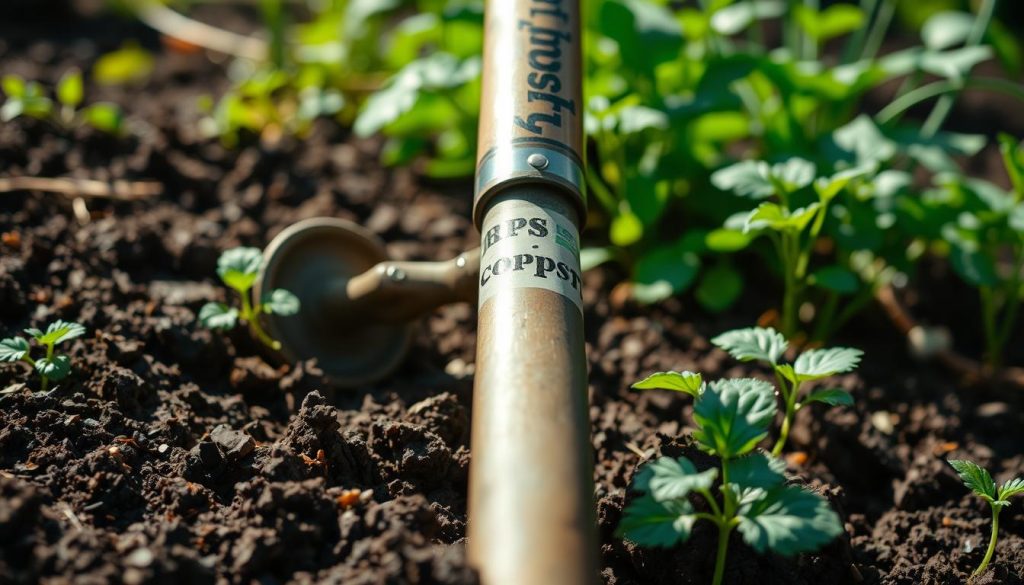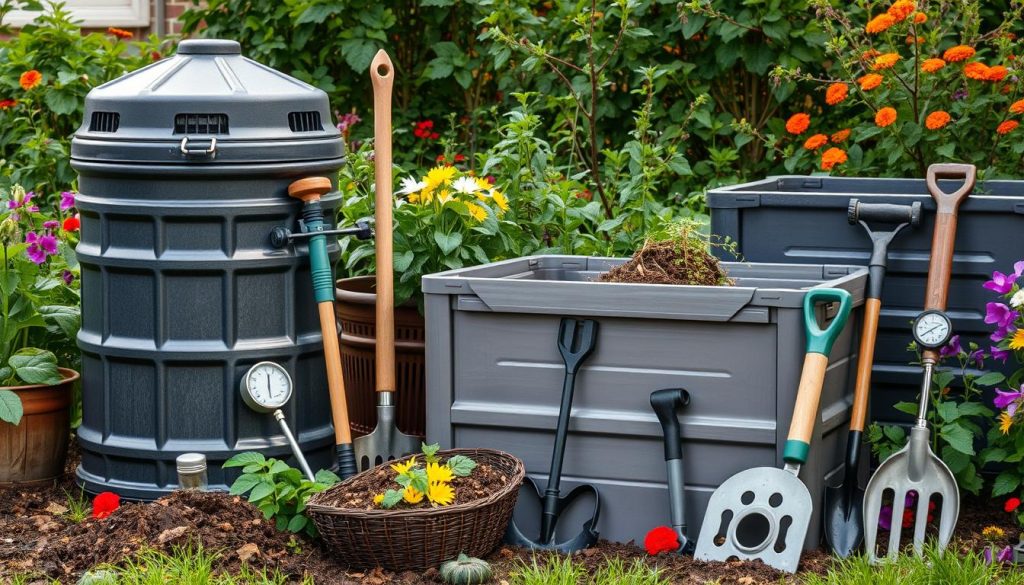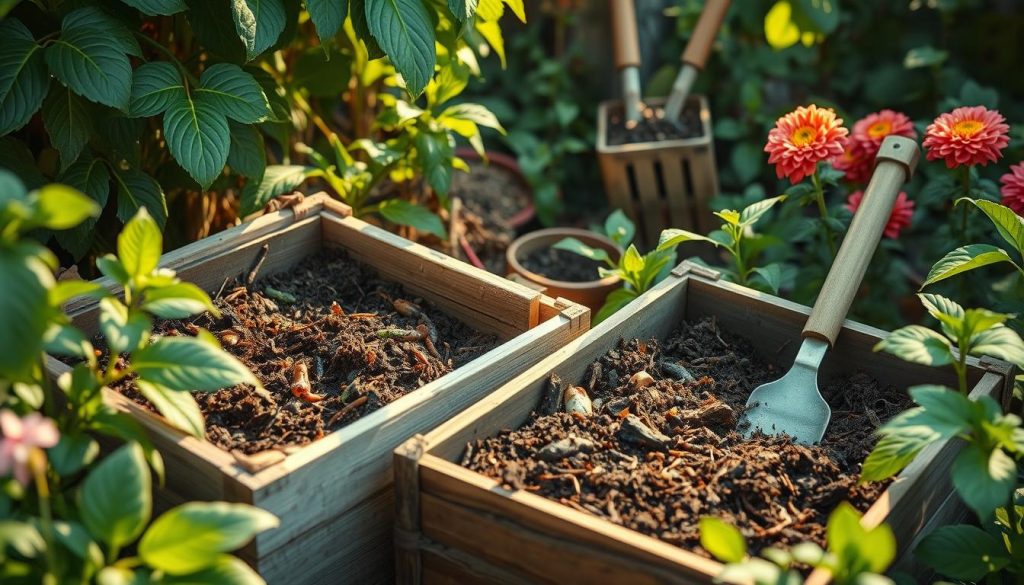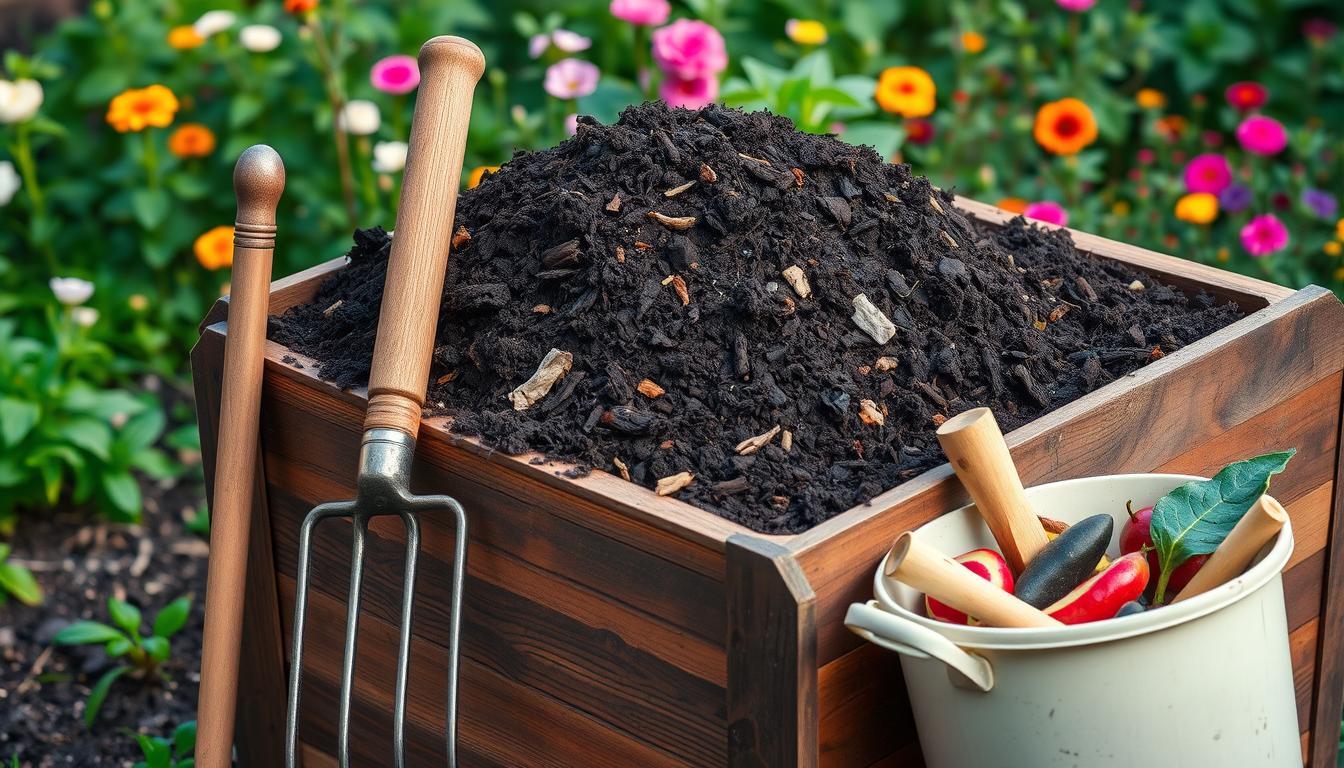As a gardener, I’ve found that the right composting tools are key. They help turn food scraps and yard waste into valuable soil for my garden. With the best tools, I can reduce waste and make gardening more sustainable.
Composting tools are crucial for a healthy garden. They give my plants the nutrients they need to grow strong. Tools like compost bins and tumblers speed up the composting process, making high-quality compost. By choosing the best tools, my garden gets the nutrients it needs, and I enjoy a rich harvest of fresh produce.
Understanding the Basics of Composting Tools
As a gardener, I’ve found that the right composting tools are key to a healthy garden. Composting breaks down organic materials into a soil amendment full of nutrients. It’s important to know the basics of composting tools to help your garden grow.
Compost bins are essential for composting. They keep organic materials in one place, making them easy to manage. Choose a bin based on your garden’s size and waste amount. A small bin works for small gardens, while a big one is better for larger spaces.
When picking composting supplies, think about what you’ll be composting and how much work it will be. For example, if you compost food waste, look for a bin with a filter to control smells. For yard trimmings, a bigger bin with air holes is better.
Why Use Composting Tools?
Composting tools, like bins, make nutrient-rich soil that boosts plant growth and cuts down waste. They also help the environment by reducing landfill waste and the need for chemical fertilizers.
Essential Components of Composting
A good composting system needs a mix of “green” and “brown” materials. Composting supplies, like bins, help manage these materials for better decomposition. Key parts of composting include:
- Carbon-rich materials (brown materials)
- Nitrogen-rich materials (green materials)
- Moisture
- Aeration
By understanding composting tools and using them, you can make your garden sustainable and productive.
Top Composting Tools I Can’t Live Without

As a gardener, I’ve found that the right tools are key to a great compost pile. A few tools have become must-haves for me. They make composting easier and ensure my compost is top-notch.
A compost turner is essential for aerating my pile, speeding up decomposition. It’s great for big piles, making it easy to mix everything. A compost aerator also introduces oxygen, which is vital for healthy microbes.
Compost Bins
Compost bins keep my pile tidy and organized. They come in many sizes and materials. Using a bin helps me compost consistently and keeps my garden neat.
Compost Tumblers
Compost tumblers are a favorite of mine. They make turning and mixing my compost easy. They’re perfect for small piles or those who want easy composting.
Aeration Tools
Aeration tools, like compost aerators, are crucial for oxygen in my pile. They support beneficial microbes, which break down organic matter. Using these tools ensures my compost is healthy and well-oxygenated.
In conclusion, these tools are vital for my gardening. With a compost turner, aerator, bins, tumblers, and aeration tools, I make excellent compost. This enriches my soil and helps my plants grow well.
| Tool | Description |
|---|---|
| Compost Turner | A tool used to aerate and turn compost piles |
| Compost Aerator | A tool used to introduce oxygen into compost piles |
| Compost Bins | Containers used to hold and organize compost piles |
| Compost Tumblers | Tools used to turn and mix compost piles |
Tools for Starting Your Composting Journey
Starting to compost? You’ll need the right tools for a successful compost pile. A compost thermometer helps you keep an eye on the pile’s temperature. This ensures it’s just right for breaking down materials. A rotating composter is also handy, making it easy to mix and aerate your compost.
To begin composting, you’ll need some basic tools. These include:
- Shovels and pitchforks for turning and aerating your compost
- Chopping tools for preparing greens and browns, such as a garden fork or pruning shears
With a compost thermometer, you can keep your compost at the perfect temperature. This is between 130°F and 140°F. This temperature helps your compost break down faster and supports healthy microorganisms. A rotating composter is also useful. It makes it simple to mix and aerate your compost, preventing clumps and bad smells.
With these essential tools, you’re ready to make a great compost pile. Use a compost thermometer to check the temperature often. Also, turn your compost regularly with a rotating composter. This ensures it decomposes well.
Advanced Composting Equipment for Enthusiasts

Exploring the world of composting, I found that the right tools are key. For those serious about gardening, investing in top-notch composting gear is crucial. Essential items like worm bins and compost aerators can elevate your composting skills.
Composting tools help create a healthy environment for decomposition. Worm bins are great for compact composting of food waste. They produce nutrient-rich compost perfect for your garden. Compost aerators ensure your pile gets enough oxygen, vital for decomposition.
Monitoring your compost’s progress is vital. Thermometers help track the pile’s temperature, ensuring it’s ideal for decomposition. These tools help create high-quality compost full of life. Key benefits include:
- Increased efficiency in decomposition
- Better compost quality
- Less odors and pests
Adding these advanced tools to your composting setup will help your garden thrive. With the right tools, your gardening will flourish, leading to a bountiful harvest.
| Composting Tool | Benefits |
|---|---|
| Worm Bins | Compact, efficient, and perfect for composting food waste |
| Compost Aerators | Ensures adequate oxygen supply, promoting healthy decomposition |
| Thermometers | Monitors temperature, ensuring optimal conditions for decomposition |
How to Choose the Right Composting Tools
Choosing the right tools for composting is key. With many options, picking the best can be tough. First, think about what you’ll be composting. Will it be food scraps, yard waste, or both? Knowing this helps you pick the right supplies.
Next, think about your budget. Quality composting tools might seem pricey, but they’re worth it. Look for tools that last, like compost bins, tumblers, and aeration tools. These help your compost pile thrive and cut down on garden waste.
- Choose a compost bin or tumbler that fits your pile size.
- Opt for tools made from durable, sustainable materials.
- Pick tools designed for your composting type.
By following these tips and investing in quality tools, you can make your compost pile flourish. Remember to balance your budget with the need for durable supplies.
| Composting Tool | Description | Price |
|---|---|---|
| Compost Bin | A container for holding compost | $50-$100 |
| Compost Tumbler | A device for turning and aerating compost | $70-$150 |
| Aeration Tool | A tool for adding oxygen to the compost pile | $20-$50 |
Maintenance of Composting Tools

To keep your composting tools in top shape, regular care is key. This means cleaning and sanitizing your bins and tools, like a compost turner. Doing this helps keep your compost quality high and your garden healthy.
Cleaning your compost bins is easy. Just take out the finished compost and wash the bin with water. For stubborn stains or smells, a mild detergent or vinegar mix works well. It’s also vital to sanitize your compost turner and tools to stop disease spread.
Cleaning and Sanitizing Tips
- Use a mild detergent or vinegar solution to clean your compost bins and tools
- Rinse all equipment thoroughly with water to remove any residue
- Sanitize your compost turner and other tools regularly to prevent the spread of diseases
Storing your composting tools right is also important. Place them in a dry, well-ventilated spot to avoid rust. By following these easy tips, your tools will last longer and work better.
Eco-Friendly Composting Tools to Consider
As I explore composting, I’ve learned the value of eco-friendly tools. They help cut down waste and protect our planet. A compost aerator is key, as it lets oxygen into the compost pile, speeding up decomposition.
I also use a compost thermometer to check the pile’s temperature. It should be between 130°F and 140°F for best microbial growth. These tools help me make rich soil for my garden.
Benefits of Eco-Friendly Composting Tools
Using eco-friendly tools has many perks. They reduce waste, lessen environmental harm, and support sustainable gardening. Here are some tools to think about:
- Compost bins from biodegradable materials
- Tools like trowels from sustainable sources, like bamboo or recycled materials
- Compost aerators and thermometers that last long
Choosing eco-friendly tools cuts your carbon footprint and supports sustainable gardening. Whether you’re new or experienced, there are many tools to help you succeed.
Choosing the Right Eco-Friendly Composting Tools
When picking eco-friendly tools, look at the materials and how well they work. Opt for tools made from biodegradable stuff like bamboo or recycled plastics. Also, pick tools that will last a long time. Quality, eco-friendly tools help you garden sustainably and reduce waste.
| Tool | Material | Benefits |
|---|---|---|
| Compost Aerator | Stainless Steel | Speeds up decomposition, reduces odors |
| Compost Thermometer | Recycled Plastics | Monitors temperature, ensures optimal microbial growth |
Tips for Efficient Composting with Tools
Composting is an art, and the right tools can make all the difference. I’ve found that employing strategic layering techniques and properly timing and turning my compost are key to achieving optimal results. By layering greens, browns, and moisture-retaining materials, I create the perfect environment for microorganisms to break down organic matter effectively.
Layering Techniques
When building my compost pile, I follow a simple rule of thumb: alternate layers of carbon-rich browns, like dry leaves or shredded paper, with nitrogen-rich greens, such as fruit and vegetable scraps. This layering approach ensures a balanced C:N ratio, which is essential for rapid decomposition. I also make sure to incorporate a bit of moisture to maintain the ideal moisture content.
Timing and Turning Your Compost
Consistent monitoring and turning of my compost pile are crucial for producing rich, nutrient-dense humus. I use a rotating composter, which makes the process of turning and aerating my compost much easier and more efficient. Depending on the materials and environmental conditions, I typically turn my compost every few weeks to ensure even breakdown and prevent odors.
By incorporating these tips and utilizing the right composting tools, I’ve been able to create a thriving, nutrient-dense compost that I’m proud to use in my backyard garden. The journey of efficient composting is a rewarding one, and I encourage all gardeners to give it a try.

